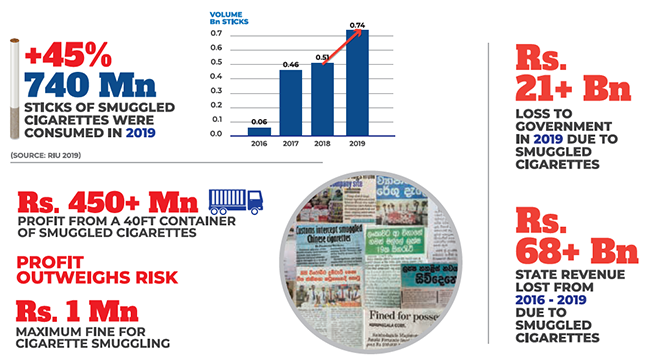Ceylon Tobacco Company - How illicit trade impacts Sri Lanka
The smuggled trade undermines tobacco control policies implemented by the Sri Lankan Government and results in a massive loss in government revenue, while funding of transnational criminal activities. smuggled cigarette earnings have been linked to funding narcotics, weapons, terrorist organizations, human & sex trafficking.
This video is based on true events and provides an in-depth insight into the unscrupulous world of Sri Lanka’s cigarette smuggling network.
Trading of Smuggled Cigarettes in Sri Lanka
Latest figures from the report - ‘Economics of Tobacco Taxation in Sri Lanka’ published by the Research Intelligence Unit indicates that 740Mn smuggled cigarettes were consumed in Sri Lanka in 2019 alone. This is no surprise with Sri Lanka currently having the highest cigarette prices in the world in relation to purchasing power parity (WHO Report on the Global Tobacco Epidemic – 2019). The smuggled cigarette industry has grown exponentially over the past 3 years in the absence of a level playing field.
99% of smuggled cigarettes make their way into Sri Lanka via the free port of Dubai, from Turkey, China and Vietnam.
Cigarette Smuggling: Low Risk - High Reward
Given that the maximum penalty for smuggling illicit cigarettes in Sri Lanka is LKR 1 million, the low risk - high reward scenario is a major incentive for many crime syndicates to divert resources to smuggling cigarettes.

Fighting the smuggled cigarette industry in Sri Lanka
Abolishing smuggling requires strong cooperation between the Government, law enforcement and the legal industry. Here are a few things that can help fight smuggling cigarettes into the country.
- State to actively carry out obligations of WHO Protocol to Eliminate Illicit Tobacco Trade
- Robust deterrence through increased penalties, making the illicit trade unviable
- Dedicated law enforcement units to tackle smuggled cigarettes
- State engagement with foreign governments to stop products at origin
- Cross industry collaboration & knowledge sharing
- Greater public awareness on the ill effects of the smuggled cigarette industry


